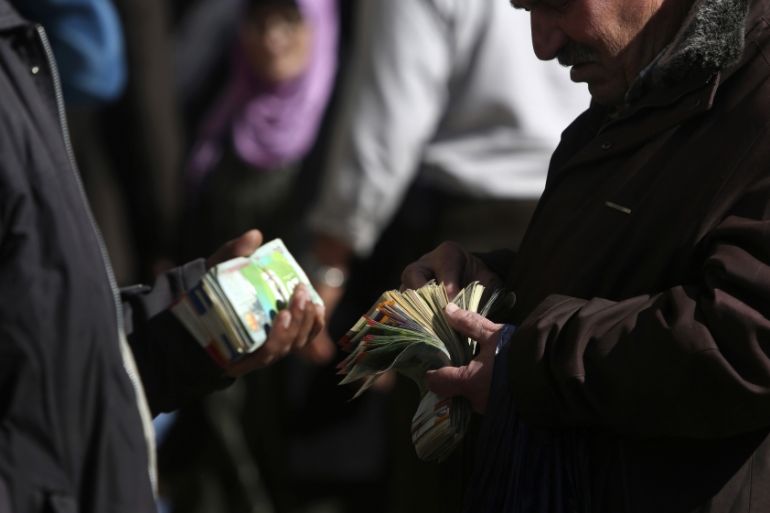Palestinians lose $285m in revenues due to Israel deal
Palestinian Authority is losing hundreds of millions of revenues annually due to ageing Israel accords, World Bank says.

Ramallah, Palestine – The Palestinian Authority is being deprived of $285m in revenues annually, the World Bank said on Monday, attributing these losses to arrangements outlined by the Paris Protocol, the Oslo Accord-era agreement that determined the economic relationship between Israel and the Palestinians.
The report, which also said Israel is withholding an additional $669m in accumulated Palestinian revenue, will be presented to the Ad Hoc Liaison committee of donor states to the PA on Tuesday in Brussels.
This number includes pension contributions from Palestinian workers inside Israel, as well as salary deductions for their health and social benefits, which are supposed to be transferred to a dedicated fund that the PA has yet to establish, the bank said.
These lost revenues could reduce the PA’s 2016 fiscal deficit to below $1bn, and more than half the expected shortfall in financing, said Steen Lau Jorgensen, the World Bank’s country director for the West Bank and Gaza Strip, in a statement.
Paris Protocol
Under the 1994 Paris Protocol, Israel was expected to collect taxes on the PA’s behalf – import duties, value-added tax and other revenues which constitute more than 66 percent of total public revenue – and turn them over every month. The lost revenues exclude taxes collected in Area C – 60 percent of the West Bank under full Israeli military and administrative control.
The World Bank said that these arrangements have not been systematically applied, leading to lost revenue, which is also being diluted by tax leakages on trade between the PA and Israel, and the undervaluation of Palestinian imports from third countries.
The report recommended resurrecting the defunct Israeli-Palestinian Joint Economic Committee, which was created to ensure the Paris Protocol is implemented and bilateral problems are resolved. It also called for re-examining the high handling fee Israel charges the PA, which it uses to fund more than 30 percent of its own finance ministry’s customs and VAT department.
Observers said that the report highlights only some of the ways in which Israel benefits from the Palestinians.
“This report is just one small aspect of Israel’s money-making machine,” said Diana Buttu, a lawyer and former adviser to the Palestine Liberation Organization. “Israel actively blocks the economy and imposes these ridiculous fees.”
“Part of the denial of political freedom is the denial of economic freedom,” Buttu told Al Jazeera. “Israel has, for years, made money from the denial of Palestinian freedom, whether by stealing land, resources, or by blocking off Palestinians through checkpoints, so as to make it easier to flood Palestinian markets with Israeli goods.”
Limited growth
The bank voiced concern over limited economic growth in both the West Bank and Gaza Strip. Last year, the economy saw a 3.5 percent growth that it said was barely enough to match the population growth. “More needs to be done to overcome tax losses and stimulate growth in an economy that is not growing enough to raise living standards or reduce high unemployment,” the report said.
In the Gaza Strip, recovery has been prolonged because of slow aid, with only 40 percent of the amount pledged at the 2014 Cairo Conference disbursed. “…Only 9 percent of totally damaged houses and 45 percent of partially damaged houses [in Gaza] have been repaired,” Jorgensen said. “Over 14,800 families continue to be displaced. For these people in Gaza, there is no escape.”
Some critics noted that while the report is a helpful means to quantify losses, it is missing the context needed to impact policy intervention.
“It is astonishing that, once again, the word ‘occupation’ is not mentioned at all in this new World Bank report, which reflects deep problematic understanding and framing,” said Alaa Tartir, the program director of Al Shabaka, the Palestinian Policy Network.
“As a UN body, the World Bank must be obliged to use the language of international law that recognises the illegality of the Israeli occupation of the Palestinian land, and calls it an occupation – not “restrictions and political instability”, Tartir told Al Jazeera.